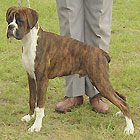Breed: Boxer
Temperament: active and boisterous
Cost: $600 up
Lifespan: 8-9 years
Maintenance: low
Recommended for: families with older children
History
The Boxer is a striking and easily identified breed. First developed by German breeders, the Boxer is thought to be the product of various other breeds including the early Great Danes and English Bulldogs though this mastiff has been in its present form since around the late 1800’s. It is thought that the term ‘Boxer’ may be derived from the name of a variety once called boxl, or perhaps from the German term bullen-beisser, which translates to bull-biter.
The Boxer is a very popular breed in Australia, having occupied a place in the top ten most popular dog breeds for over ten years.
Appearance
Boxers are the tallest of the brachycephalics; those breeds which are distinguished by their short snouts and undershot jaws such as pugs and bulldogs. Breeders say the development of this undershot jaw was encouraged as it was believed to be better suited to holding its prey. Boxers have a strong, well-muscled physique with a broad chest and barrel-like forequarter tapering to a narrow hindquarter. A medium sized dog, slightly taller than an Australian Cattle Dog, the boxer has a smooth, sleek coat either red or brindle (red and black) in colour with white generally evident around the chest, muzzle and lower limbs.
Boxers which are predominantly, if not exclusively, white may also appear in litters. They are sometimes born deaf and are sensitive to sunlight. It is not uncommon for these particular dogs to be put down by veterinarians at the request of breeders as these conditions are believed to adversely affect the dog’s health and welfare. Since white boxers are virtually identical to white bull terriers, this policy seems rather silly. Tails were generally docked, although full-tailed dogs are becoming more evident.
Temperament
Fearless and self-assured, the Boxer can cast a striking and imposing figure when alert and watchful. They are a lively dog, bouncy and energetic but wary of strangers and have strong guarding instincts. Boxers need obedience training early in life to curb their natural exuberance, but respond well to thoughtful training and continued positive reinforcement. Boxers are also extremely loyal to their families. Expect your Boxer to take up to two years to mature.
Health
The breed isn’t without its health concerns. Cardiac disease affects up to 50% of dogs and Burke’s Backyard consulting veterinarian Rob Zammit recommends that prospective owners have the pup screened by a veterinarian before purchase. Unfortunately cancerous tumours are also very common to the breed and any unusual lumps should be reported to the vet. When purchasing a pup, try and view both parents and ascertain their age; older dogs, free of lumps are desirable. Always look for evidence of tumours on the parents and avoid blood lines which have a history of cancer.
Lifespan and cost
These health issues cause the Boxer to be one of the shorter lived breeds. Healthy boxers will remain members of the family for around 8-9 years. Cost: $600 up.
Breeding
Certain breeding problems exist within the brachycephalic breeds. Narrow hips, combined with broad shoulders, often cause difficult deliveries of pups during whelping. However, breeders say these problems are not as common or severe with Boxer bitches, although caesareans are required on occasion. Litters will average five pups.
Space and exercise
A medium to large backyard is ideal and high fences are a must as Boxers are notorious jumpers. A minimum 30 minute walk daily is recommended otherwise you may expect your dog to become bored, hyperactive and destructive in the yard.
Maintenance
The short, close lying coat sheds little and requires minimal grooming. A wipe-over with a damp cloth once weekly will generally suffice and all-in-all, Boxers are very easy to care for. White patches on the face and paws can suffer weeping lesions if exposed to the sun for prolonged periods. Applications of sunblock to these sensitive areas may be required.
Recommended for
The excitable nature and strong physique of this breed makes it unsuitable around small children or those shy of dogs. However the Boxer is an ideal family dog for those with older children, bonding well with its family members and always up for a game or a walk. The deep bellow of a bark and strong guarding instincts also ensures that unwanted visitors will think twice before dropping in.
Further information
We filmed this segment with David and Fay Crooks in Sunbury, near Melbourne. David is President of the Boxer Association of Victoria and can be contacted on (03) 9744 6697.
NSW
National Boxer Council & Boxer Club of NSW Inc
Secretary Liz Gunter
Phone: (02) 4684 1176
Western District Boxer Club of NSW
Secretary Janet Halliday
Phone: (02) 4889 8084
WA
WA Boxer Club Inc
Secretary Sue McKie
Phone: (08) 9497 4708
Tas
Boxer Club of Tasmania Inc
Secretary Jean Chenhall
Phone: (03) 6339 1022
Qld
Queensland Boxer Club Inc
Secretary Deanne Campbell
Phone: (07) 5547 8161
ACT
Canine Association – ACTCA
Phone: (02) 6241 4404
SA
South Australian Canine Association – SACA
Phone: (08) 8349 4797
NT
North Australian Canine Association – NACA
Phone: (08) 8984 3570



